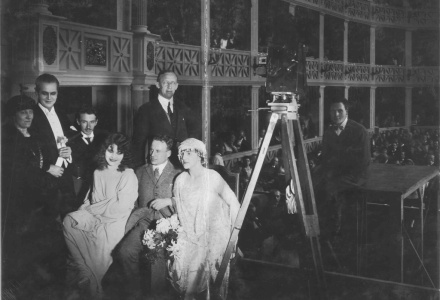Gloria fatalis
Summary
When Sybil Mora, a celebrated opera singer, is a guest at a country estate, her host and his family take her to the village church to admire its treasures. There Sybil is greatly impressed by the music played on the organ by the village schoolmaster and, when she meets this simple man, is convinced that he is a genius who, with her support, can become a famous composer. They marry and for a year or two are happy together, blessed as they are with the birth of a daughter. However, Sybil soon longs for the carefree, Bohemian life she enjoyed before her marriage, whereas her husband, now conductor in the opera-house, prefers the simplicity of country life. Their relationship becomes more and more strained and ends in a furious quarrel after a performance of Carmen. Without informing her husband, Sybil signs a contract with an American impresario on condition that she may take her child with her. The composer prevents her flight with the little girl and drives Sybil out of their home. Overpowered by his emotions, the man has a heart attack.
Years later, sick in body and soul and her career finished, Sybil returns to Europe longing to see her husband and child. The composer, now old and blind, has retired to a village where he lives only for his daughter. The only reminder of happier times is the song he dedicated to his famous wife, a song the girl sings every evening. It is thanks to this song that Sybil finds her family again. Completely exhausted, she dies in the arms of the two people she deserted years ago but whom she has always loved.
Information
Images
Cast
Actor
- Sybil Mora
- Their grown-up daughter
- Village schoolmaster
Crew
- Director
- Producer
- Producer
- Music performers (corp)
Technical notations
Resources
G. Donadson, Of Joy and Sorrow. A Filmography of Dutch Silent Fiction, Amsterdam (1997), p. 222
more information
If you are looking for more material from our collection, please contact Film Sales:
sales@eyefilm.nl
phone +31 (0)20 5891 426



